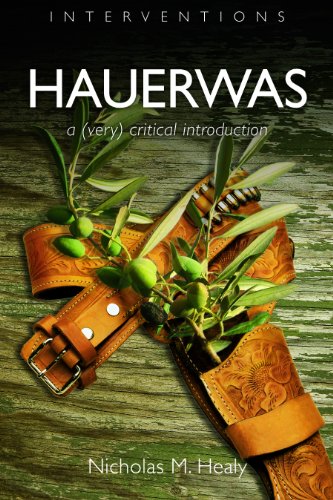 Now available from the Interventions [1] series, Hauerwas: A (Very) Critical Introduction, by Nicholas M. Healy (Eerdmans; March 2014; 154pp)
Now available from the Interventions [1] series, Hauerwas: A (Very) Critical Introduction, by Nicholas M. Healy (Eerdmans; March 2014; 154pp)
[Purchase: Eerdmans.com [2] | Amazon.com [3] | Amazon.co.uk [4]]
Book description:
Stanley Hauerwas is one of the most important and robustly creative theologians of our time, and his work is well known and much admired. But Nicholas Healy — himself an admirer of Hauerwas’s thought — believes that it has not yet been subjected to the kind of sustained critical analysis that is warranted by such a significant and influential Christian thinker. As someone interested in the broader systematic-theological implications of Hauerwas’s work, Healy fills that gap in Hauerwas: A (Very) Critical Introduction.
After a general introduction to Hauerwas’s work, Healy examines three main areas of his thought: his method, his social theory, and his theology. According to Healy, Hauerwas’s overriding concern for ethics and church-based apologetics so dominates his thinking that he systematically distorts Christian doctrine. Healy illustrates what he sees as the deficiencies of Hauerwas’s theology and argues that it needs substantial revision.
Blurbs:
“A must-read! Healy interprets Hauerwas as mirroring Schleiermacher. It’s a provocation so clearly argued that this will become a touchstone, not just for future interpretation of Hauerwas but for our engagement with a great deal of contemporary theology.” — R. R. Reno, editor of First Things
“Theological controversy is an art in which few are skilled. This (very) critical response to a much-admired contemporary, however, exemplifies the virtues necessary to mount a substantial challenge without straying into invective: it keeps calm; it concentrates on matters of substance; it manifests sympathetic understanding of the body of writing which it seeks to contest; and — more than anything — it articulates its puzzlements and disagreements on the basis of convictions about God and the gospel.” — John Webster, University of St. Andrews
[Purchase: Eerdmans.com [2] | Amazon.com [3] | Amazon.co.uk [4]]
